- Home
- J. P. Donleavy
The History of the Ginger Man: An Autobiography
The History of the Ginger Man: An Autobiography Read online
The History of The Ginger Man
J. P. Donleavy
Contents
Title Page
1
2
3
4
5
6
7
8
9
10
11
12
13
14
15
16
17
18
19
20
21
22
23
24
25
26
27
28
29
30
31
32
33
34
35
36
37
38
39
40
41
42
43
44
45
46
Publisher’s Note
BY THE SAME AUTHOR
Copyright
These sentiments concerning my three years spent by the sea in County Wicklow, written to Gainor Stephen Crist and just prior to departing Ireland to the Isle of Man, from which I would eventually set off to the United States, recalling to him the Catacombs and two of his favorite pubs, the Kosmos House and the Seven Towers, both now demolished. I allude to the fact we would not graduate from Trinity and that one had to walk on wintry mornings two hundred yards to reach the university’s outdoor latrine.
The History of The Ginger Man
1
IF ONE CAN NOT exactly designate, choose, or spell out the very most important moments in one’s life, there being so many summits of hope and troughs of despair, it is most often those moments when one has felt the greatest relief that one can most easily recall. And it was on a mild moist morning of an Irish midland March day in the year 1978 that I received the following letter in French into my hand from one of my last remaining Paris lawyers.
63 Av. Raymond-Poincaré,
Paris, le 20 Mars 1978
Monsieur J. P. Donleavy,
Levington Park,
Mullingar,
Co. Westmeath,
Ireland.
Aff. Dte. LITTLE SOMEONE c/Garnier, Olympia Press
Ref: 137/N
Monsieur le Directeur,
I hasten to inform you that this case has now come before our Court.
I have the pleasure to tell you that your adversary’s appeal has been turned down.
As soon as I obtain a copy of the Judgment I shall send it to you.
Please be assured, Monsieur Director, of my most distinguished and devoted feeling.
Jean-Martin Martinière,
Avocat au Conseil d’Etat
et a la Cour de Cassation
This communication concluded a litigation concerning The Ginger Man which had begun twenty-one years previously in the June of 1957 and had been variously fought in London, Paris and New York. Over the years, one did not exactly welcome the sight of legal letters, especially those coming from what seemed a remote, unfathomable, dark world of jurisprudence in Paris and further complicated by the French language. But as I spied the word “plaisir,” I realized that instead of having to implacably steer my legal battalions again into the battle, I could now instead indulge a moment of milder worries. And even smile, for at long last I’d put to death this interminable lawsuit, which had on many a previous waking dawn unpleasantly crept into one’s consciousness.
At the end, the protagonists J. P. Donleavy, the author, the Olympia Press and Maurice Girodias, the publisher, were somewhat removed in name from the present plaintiff and defendant, respectively Garnier-Olympia Press versus The Little Someone Corporation. And I had meanwhile even become the owner of my enemy. Achieving thereby a revenge I’d nearly forgotten I’d sworn so many years before. When upon a summer morning down a little side street in the London borough of Fulham, where with a copy of the first edition of The Ginger Man in my hand, I smashed my fist upon its green cover format, published as it was in the pseudonymous and pornographic Traveller’s Companion Series of the Olympia Press, and I declared aloud, “If it’s the last thing I ever do, I will avenge this book.”
And another strange irony which one could never have predicted. As I now sit looking at that same first edition published to my horror all those years ago and selling at its modest price in French francs, this selfsame copy resides now a treasure in my archives, having increased in value many a hundred times over. And in the margin of the early draft manuscript pages of this work and never published, were written the words.
Anyone
Can be a friend
So long as you don’t
Get to know him
Too well
And anyone
Can be an enemy
And you get
To know him
Better
Than most
2
THE FIRST INKLINGS of the notion of the book that was to become The Ginger Man brewed in Ireland following American Thanksgiving Day of 1949. It was upon an afternoon of turkey, sweet potatoes, spices and Beaujolais, feasted over within a tiny house consisting of two cramped rooms, front and back on two floors, at number 1 Newtown Avenue, Blackrock, County Dublin. My host was Michael Heron and his then wife, Camilla. The latter an American dark-skinned beauty, new to Ireland and fresh from Paris, where she was a somewhat lesser chanteuse toast of the town than her friend Josephine Baker. Finding the Irish climate unbearably cold and damp, Camilla often had to remain abed to receive her guests, as she reclined stacked over with blankets and snuggled up in feather boas, while running an electric hot iron over herself to keep warm. Heron, a handsome, sensitively literate and gourmet Englishman, had shared rooms with me at 38 Trinity College, and later I married his sister, Valerie.
Michael Heron, with whom I shared rooms at Trinity College, contemplatively viewing the world and whose enlightened tastes for literature, food and wine formed a pleasantly influential background to one’s university life and whose beautiful sister became my first wife.
In these years following the end of the Second World War, the outside world’s spiritually uncivilizing influences, such as cars, plumbing and neon lights, were now showing up in Ireland. A population, long without a pot to piss in, were unearthing all kinds of newfangled shiny receptacles. And the last of one’s Dublin and university contemporaries were heading off to various parts of the globe. Some with chastened tails between their legs, others clutching hopeful degrees but all in search of two pennies to rub together. A few, more affluent, were grandly heading to tour exotic continents in search of further and better, if not more pleasant, particulars of life and soul. And it was upon this American Thanksgiving day I sensed that the celebratory, boisterous and resolutely careless mayhem world of Dublin which we had survived, and the benign, elegantly cloistered life within the sanctum of Trinity College which we had enjoyed and to which we had all originally come, were finally over.
With me in the background, Gainor Stephen Crist with his first wife, Constance. All in our tweeds and sporting exemplary respectability, one cannot remember the extraordinary circumstances that must have existed when this photograph was taken to find the three of us in front of my rooms at number 38 Trinity College, my name just legible painted in white on the entrance behind us.
We had been a small colony of foreign students in what was, on the surface and in language, apparently not
a foreign land. But whose citizens we soon learned were deeply alien to us in other ways which we soon collectively referred to as having the “crut.” This being the name applied to the inhibiting, impenetrable encasement of intellectual and sexual repression which seemed to envelop the majority of the Irish in mind and body. But to this chronic condition there had been found exceptions. And within this room, where one Americanly, thanksgivingly dined, one was reminded of the bedroom above, where the likes of the patriot, revolutionist, housepainter, poet, playwright and raconteur Brendan Behan and other Celtic amoralists had cavorted. Their lewd antics often watched stoically by two lady spinsters from the high vantage point of their window directly across the street. And at whom, during his demonstrations of freedom of the flesh, Behan would shake, insert and pull upon various appendages hoping to inspire some expression upon their implacably expressionless faces. And as no reaction would come from the spinsters, the otherwise naked Behan would declare out the open top half of the window.
“Ah the blase likes of youse sedately up there are not to provoke me to remove me belt which for the sake of me own modesty I wear around me belly to hide me provocatively sensuous navel.”
The Dublin trams roared past this little house from early morn till approaching midnight, and daily one would awake to the clip clop of black-plumed horses pulling hearses and carriages of mourners on their way to bury the dead at Dean’s Grange Cemetery two miles farther up the road. I had on the odd occasion of missing the last tram back to my rooms at Trinity College, curled up, in the lumpy confines of a sofa in this front tiny room, once sleeping while Gainor Stephen Crist, the original occupier of this dwelling, sat across from me with a book reading the night away about Spain.
Although others who knew him well might not agree, Gainor Stephen Crist was an entirely enchanting man. He was straightly tall, elegant and precise and circumstances providing, was always supremely courteous in manner. The newlywed Crist had, with his first wife, Constance, rented for three pounds a week this small respectable abode, where the local Protestant vicar, soon after their taking up residence, came to deliver his calling card one quiet Sunday afternoon. Crist, pagan sensualist though he was, was delighted at this sign of civilization from just up the street and always, provided they were not looking for money, welcomed any impromptu caller, preferring to magnify rather than oppose the condition of crut he might encounter. Even when such was usually further aggravated by the infrequent bathing of those suffering it. And as it happened upon this Sunday four o’clock teatime, setting an example, both Mr. and Mrs. Crist, there being no bath, were attempting to wash down from a bucket in the tiny kitchen. Which meant they never properly met this minister of the Church of Ireland. For, these newlyweds, at the sudden knock on their door, could only venture forth wrapped in skimpy towels to open up a crack to their narrow little hallway where, upon inquiring of the caller, Gainor’s towel inadvertently fell and following the vicar’s gasp, they then saw his little white card get shoved under their door.
It was upon the narrow sidewalk outside this house that I more than a few times accompanied this pleasantly saintly man Crist, with his splendidly mystical way of wasting time, to nearby public houses, where he would philosophically tackle yet another personal mishap befallen him. Such as recently sending his gray herringbone tweed suit to be dry-cleaned. Which, duly returned thoroughly washed and scrubbed, had shrunken the sleeves and trouser cuffs up to his elbows and knees. And which only suit he now had to wear to collect from the train station and carry back home a birthday present of a Great Dane puppy received from a rich American aunt. This already large animal’s weak legs were not strong enough to support it and so it was borne everywhere in Crist’s arms. But the canine baby beast’s appetite was all devouring in these larder-bare days. Its daily diet requiring a couple of pints of milk and at least two pounds of freshly ground steak. And while Crist held starvation at bay with a sheep’s head simmering on the stove, from this same aunt came a further gift, a subscription to Fortune magazine, well known required reading for international tycoons.
But Gainor Stephen Crist, stickler for facts though he was, and like most Americans preferring efficiency, was also, in this land where facts were avoided and efficiency shunned, tolerant and uncomplaining. In his impoverished circumstances he would peruse the pages of Fortune and would, with his canine birthday present grunting, good-naturedly ferry the enormous armful to the nearest pub and there with the beast collapsed at his feet he would nervously tap the bar with the edge of a half crown, ordering for himself a double Irish whiskey and a glass of draft stout plus a pint of the latter for the dog. Then with a twiddle of fingertips he would have the immediately emptied glasses refilled and announce that both he and the dog were now in the proper frame of mind to begin seriously drinking and thinking and ready to indulge another quality I found attractive in this man and which he’d already instilled in the Great Dane of being an avid listener to anything that was said.
And
Especially to some
Things
That never got
Mentioned
3
THE FADING AUTUMN of the year 1946 was a strange boom time in the world. With all its awakening hopes to provide a life dreamed of during the war. The rubble being cleared across Europe. The evil, hated enemy vanquished around the globe. And Dublin then, although rife with its slums and poverty and its shoeless children running begging through the streets, remained an unscathed oasis, unbombed and, for those who could afford, flowing with milk and honey. Bowls full of beetroot sugar to sweeten coffee in its cafes and butter to spread on its spice buns. Even more alluring was its bacon, ham, sausages, eggs and cream. Not to mention oysters, salmon, trout, prawns, saddles of lamb, and big thick steaks. Plus the limitless cascade of foamy creamy stout from its brewery to wash it all down. And these handful of ready-to-please-and-be-pleased Americans came here, each and every one of them full of great expectations. And two or three even ready to conquer the world and sporting jaunty bow ties. They frequented the pubs of Dublin which were elbow-to-elbow jammed. All day and into the evening throes of closing time as the cliche-shattering opinions flew and voices inquired.
“What are you having.”
And you’d better be having something, as bartenders with sleeves rolled back handed the glasses out over the heads as the rounds of drinks were bought and the sound of mechanical corkscrews twisted their way down with a thump and pop into the necks of the bottles of stout. And it was the name of this dark brew, stout, which had confounded me when I first encountered it in James Joyce’s writings. This beverage, which pumped blood through the hearts of the citizens and fueled the city and ended up flowing through pub latrines, sewers and back to the Liffey from whose headwaters it had first come. Gray parcels of it carried away out of the pub following closing time. Often to just down the street as it was from the pub Davy Byrnes. To either the top or bottom of a Georgian house, where amid the songs, stories and laughter, arguments or insults raged and fists flew in a flowering of discontent. Where nary a morally uplifting word was spoken as ladies screeched either in delight or affront, depending upon whose hand was taking a liberty. Or whose tongue was sticking in someone’s ear, which was a favorite way of one lady’s letting you know she was open to indecent suggestion.
At such hooleys in progress, revenge for a previous slight was widespread and disbarment common. Which at least left plenty of room for others to misbehave. Drinking may have quenched the flames of passion in some, but enough lust-incited malcontents remained to make Dublin Sodom and Gomorrah on the Liffey and then some. But this euphoric rejoicing following those first few months after the war must have been felt in other cities. And I remember having it described to me in higher tones and in a more personal manner, years later in Ireland, by a man, a multimillionaire racehorse owner, and who had come somewhat impoverished from a ravaged continental Europe to some of the still splendid streets of Oxford, and that his whole being was bursti
ng with an exhilarating sense of freedom and such enthusiastic delight that he found himself seeking out the widest thoroughfares so that he could, arms outstretched, all the better walk along them singing to celebrate the glory of being alive. But it was in the Dublin of the time where came this greatest burst of exuberance and reveling if not rapture where it was many a time heard said at hooleys and in many a pub,
“Cheer up or I’ll break your face.”
And upon this dawn of world peace, these gently brash, optimistic and iconoclastic Americans arrived in Ireland to confront the wise old ways of Europe. They were to the Irish, great conquering heroes and giants from another planet. All powerful and bigger than life, striding the Dublin streets able to dominate anything they encountered. Propaganda all over Europe preached stories and printed photographs of these conquerors dispensing their chocolate and gum and patting little children on the head. But there was no doubt that these Americans possessed of their plenty were indeed a generous race, even as they were given to assume they could teach the world how to live, as indeed they finally now have done. But here and now after the war, there was no question that they were a kindly people arrived in a shrewd, calculating and war-hardened Europe.
So unself-consciously we Americans soon learned we walked in an aura of glamour to which was added the behavioral license of being at Trinity, in itself and at the time, a distinct status of some elegance in Dublin city. As for me, I complained of nothing but cold feet at night in bed and the damp chill that needed many a glass of stout to be driven from one’s bones. And I was having to learn of political matters in Ireland. Having been brought up in the United States, where the creed one professed was of minor interest to others, I remember being somewhat surprised by my first encounters with university life and the whispers that one was a Catholic. And it dawns on me only now that the first Irish student friends one made were all of this religious persuasion. And my own Irish-born parents, avouching honesty, cleanliness and fair play in all one’s dealings rather than religious beliefs, made me mesmerized and bedeviled by this country with its sanctimonious encrustations and the widespread penchant for evading the procreative facts of life. Albeit one soon realized that to survive in the great sea of poverty prevalent in the Dublin of the time, the oft encountered sins of lying and cheating could be seen to be required.

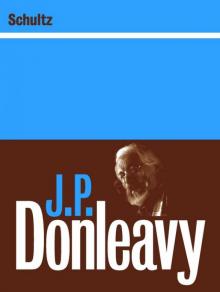 Schultz
Schultz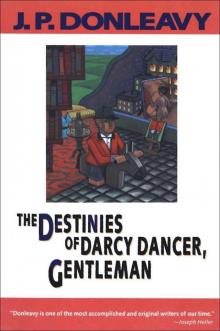 The Destinies of Darcy Dancer, Gentleman
The Destinies of Darcy Dancer, Gentleman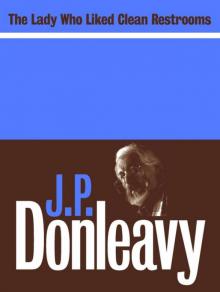 The Lady Who Liked Clean Restrooms
The Lady Who Liked Clean Restrooms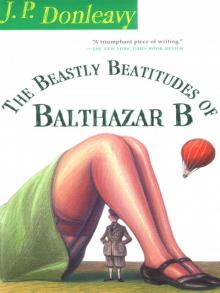 The Beastly Beatitudes of Balthazar B
The Beastly Beatitudes of Balthazar B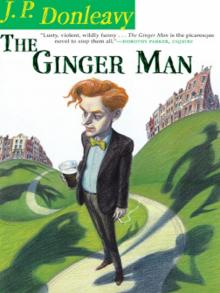 The Ginger Man
The Ginger Man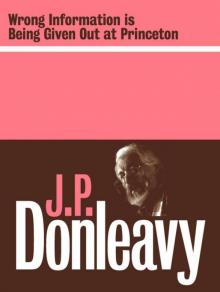 Wrong Information Is Being Given Out at Princeton
Wrong Information Is Being Given Out at Princeton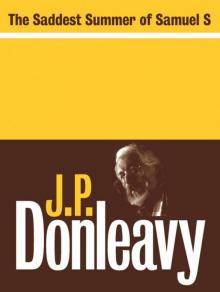 The Saddest Summer of Samuel S
The Saddest Summer of Samuel S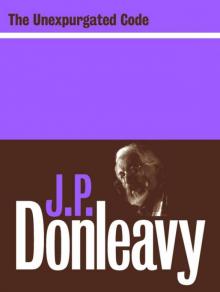 The Unexpurgated Code
The Unexpurgated Code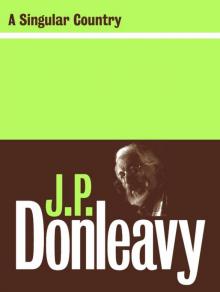 A Singular Country
A Singular Country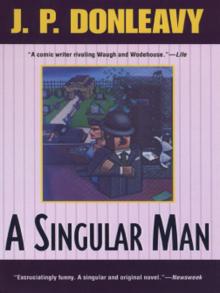 A Singular Man
A Singular Man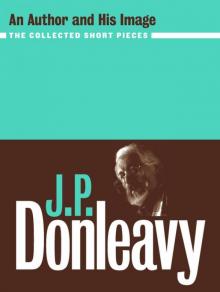 J.P. Donleavy: An Author and His Image
J.P. Donleavy: An Author and His Image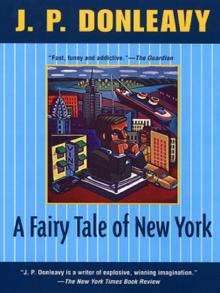 A Fairy Tale of New York
A Fairy Tale of New York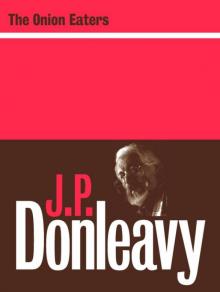 The Onion Eaters
The Onion Eaters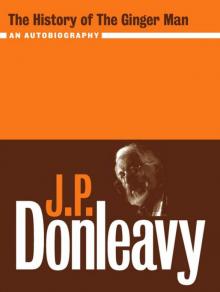 The History of the Ginger Man: An Autobiography
The History of the Ginger Man: An Autobiography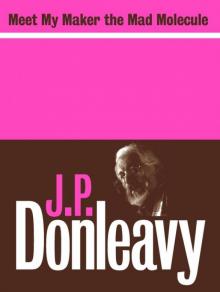 Meet My Maker the Mad Molecule
Meet My Maker the Mad Molecule Leila
Leila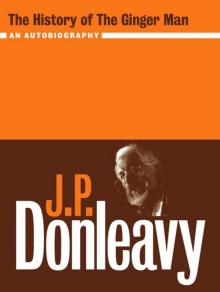 The History of the Ginger Man
The History of the Ginger Man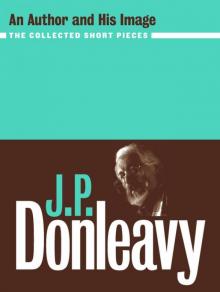 J.P. Donleavy
J.P. Donleavy